

 |
 |
||||
| Home | Reviews | Extras | Forums |
|
Comic GirlsSynopsis15-year-old mangaka Kaoruku Moeta (aka “Chaos” or Kaos-chan) ranks at the bottom of a reader survey and despairs that she’ll ever get a serialized manga. Her editor decides to have her enter an all-female dormitory for mangaka, hoping that she’ll benefit from being around other artists. Together with shounen artist Tsubasa Katsuki, shoujo romance artist Koyume Koizuka, and hentai artist Ruki Irokawa, she tries to learn what it takes to succeed as an artist…or, at the very least, not land at the bottom of the reader survey again. ReviewI’ve been enjoying a lot of the different “otaku girls” shows that’ve been coming out in the last couple of years, whether they’ve been about animators (Shirobako), game company staff (New Game!), or voice actresses (Girlish Number). There’s a contingent of feminist anime fans that feel like a lot of these shows are “straight male eye candy” for featuring “cute girls at work”, and a lot of them definitely do serialize in seinen manga magazines, but even if that’s at all the case, I get a sense that a lot of female (and particularly queer female) otaku on both sides of the Pacific feel like shows like this validate them being a part of anime fandom, regardless of the intention of whoever made these shows, and I’m no exception. Comic Girls! feels a lot like New Game! in that it’s from the perspective of an unconfident neophyte who learns a lot from being around other women working in her medium and that it also does what I think is a good job of capturing both the stress and the rewards of doing your art. Maybe a lot of shows have plugged the whole “you’d better be passionate about what you’re making, because that’s what’s going to carry you through” theme by now, but I’m not sick of it just yet, and Comic Girls gives a solid and sincere take on that theme. 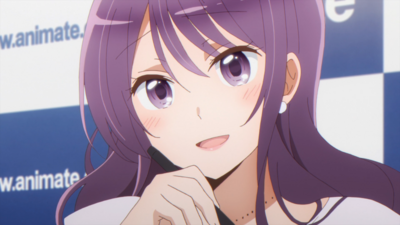 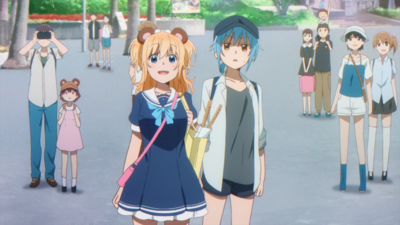 Anyway, the gender ratio with manga artists has never been as badly imbalanced as it has with gaming staff and animation staff (excluding voice actresses), not to mention that you’ve had a surprising number of female artists drawing male-targeted stuff, or at least stuff that somehow ended up in shounen and seinen magazines; there’s even a handful of genderqueer manga artists with some name recognition, like Yuhki Kamatani, who draws Nabari no Ou. So you could argue that this show is a bit more “realistic” than something like New Game!, whose all-female gaming company is said in-universe to exist for very specific reasons, or even Shirobako, where even the 50-50 male-female ratio seems a little optimistic, though that’s been changing a lot lately. I’m not positive if anything like the dorm for female manga artists actually exists, but it does seem modeled after an art school dorm….and even if it doesn’t literally exist in reality, it does seem to say that what the girls are doing is their art and their passion, even if it isn’t what society necessarily thinks they should be doing. Indeed, while the group don’t exactly get mocked for pursuing manga, a lot of the drama in the series comes from them trying to keep their manga on the DL. Obviously, the school wouldn’t be terribly happy to find out that Ruki is drawing hentai, and it’s not that surprising that Tsubasa isn’t that keen on having anybody find her gender out (and it’s also true in real life that a lot of manga artists don’t make lots of in-person appearances), but there’s more mundane stuff like the girls struggling to keep their studies up while meeting deadlines….and Tsubasa’s not even being allowed to draw manga if she doesn’t do so. Kaos-chan, we eventually learn, actually does at least have a lot of family support, but there’s a sense that if she can’t make anything interesting that her editor doesn’t really want her wasting either of their time…and as goofy as her rejection scenes are, they manage to be poignant at the same time. As for the characters themselves, I thought the main quartet made a strong group. Kaos, in some ways, is the Madoka Kaname of the group in that she’s the only character who hasn’t landed a series yet and spends a lot of the series wishy-washing about what kind of series she should make (and maybe if the eventual result is predictable, it’s still sweet). It’s obvious that while she looks up to her friends, she also doesn’t put them on a ridiculous pedestal, or at least she tries not to…for all she might get starstruck by Tsubasa’s flair, she at least tries to acknowledge that a lot of it is simply a matter of her just putting the work in. There’s a great dynamic between Tsubasa and Koyume, also; I appreciated Tsubasa’s character arc because in addition to her becoming more confident as an artist, it also feels like she becomes more comfortable with herself being a tomboyish girl. A lot of anime and manga featuring more butch or tom-presenting girls have them “femme” themselves up when they eventually fall for a boy, but if anything, I feel like this show does a pretty good job of exploring how she presents tomboyishly and mentally identifies with the swashbuckling (male) protagonist of her series…but also becomes more comfortable with being all of those things and a girl at the same time (as a somewhat gender non-conforming girl myself I definitely can relate big time). And Koyume, who draws a shoujo manga, hilariously develops a crush on Tsubasa; it’s never quite explicitly consummated, since Tsubasa can be a bit dense about this, but they do have a cute “date” that the other girls manage to crash, not to mention that Koyume, who draws a shoujo manga, amusingly starts modeling all of her male characters after Tsubasa…..if anything, I’m reminded of the fact that a lot more of the female-targeted manga I’ve been seeing come out have at least a little bit of yuri. Ruki, of course, is the one who draws a (very) lewd manga yet has no experience with men herself; it takes the group to give her a makeover for her one in-person signing to give her the vibe she needs to pull her persona off (possibly an instance of confidence=competence). 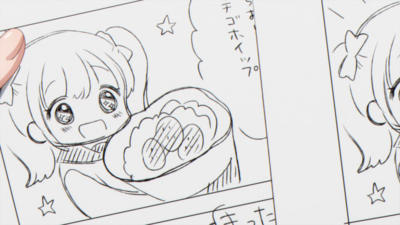 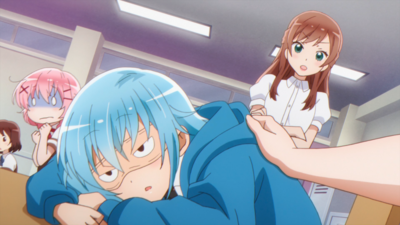 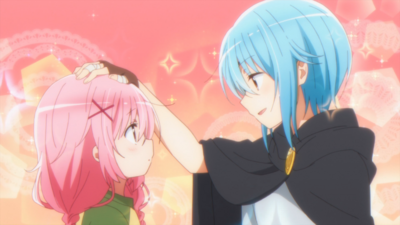
I might be getting on my soapbox a bit here, but still, Comic Girls is just a cute and fun series, overall. It can sometimes get a bit over-the-top or out of hand with its jokes, like the endless jokes about Ruki’s boobs (*sighs*), and again, you could make the arguments that it’s “women doing So, in the end, I’d definitely recommend this series; it’s definitely a bit sillier and not quite as tightly put together as Shirobako or even New Game, but it still has a lot going for it. I can’t speak for every queer female anime fan, obviously, but speaking for myself, it felt like a sincere and relatable series. It’s a solidly cute reminder of why I’ve stayed an otaku after all this time. Maybe knock off a star or two if you just can’t stand any more “cute girls doing [insert profession]” shows, but I wouldn’t dismiss this show so fast: no matter how silly it might sometimes be, it’s very heartfelt and sincere in what it does. — Nicole MacLean Recommended Audience: Not for the youngest kids, since the show talks about sex (mostly because of Ruri’s manga), and there’s some fanservice, but nothing too explicit. |
 |
|
| © 1996-2015 THEM Anime Reviews. All rights reserved. |